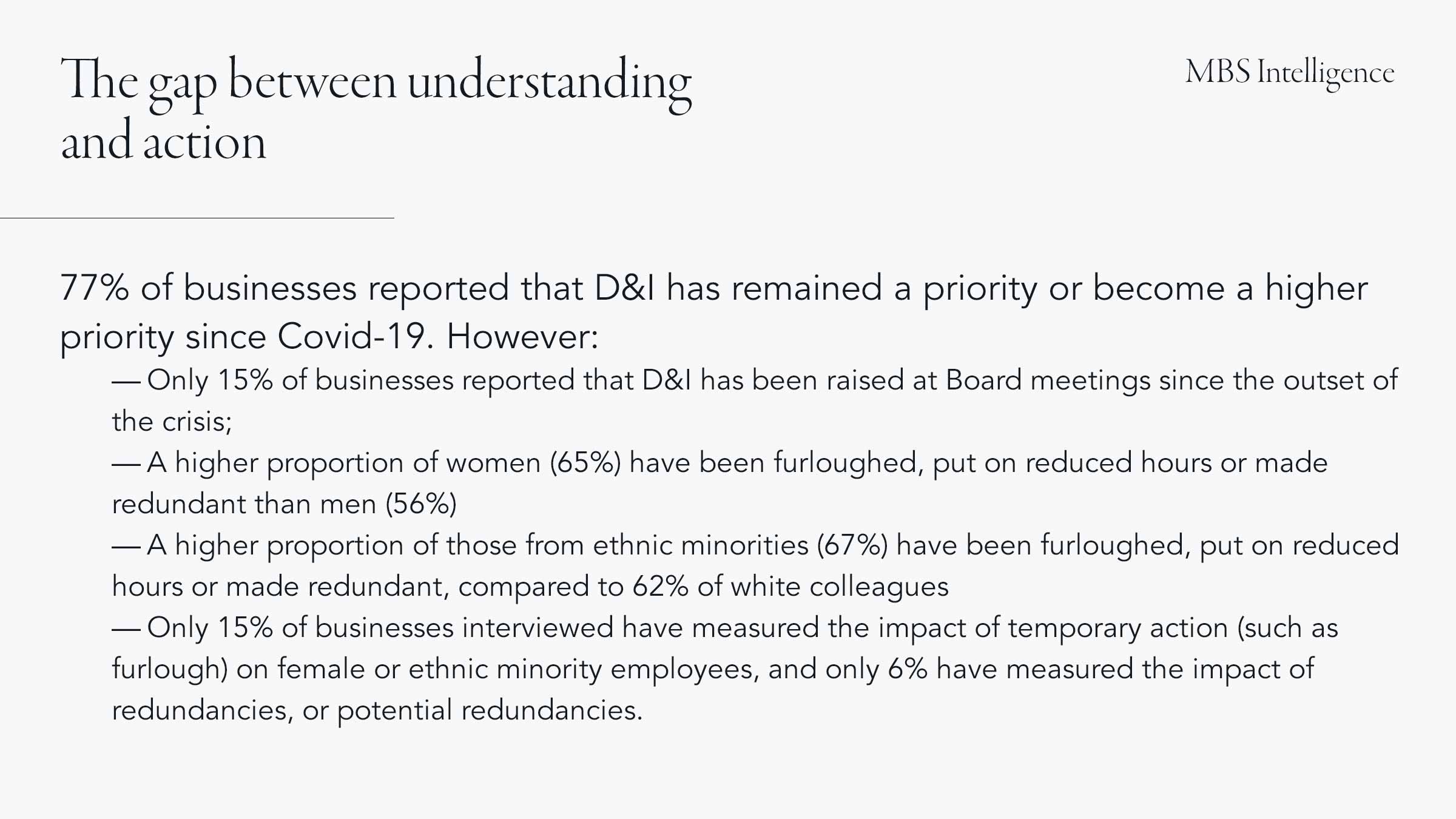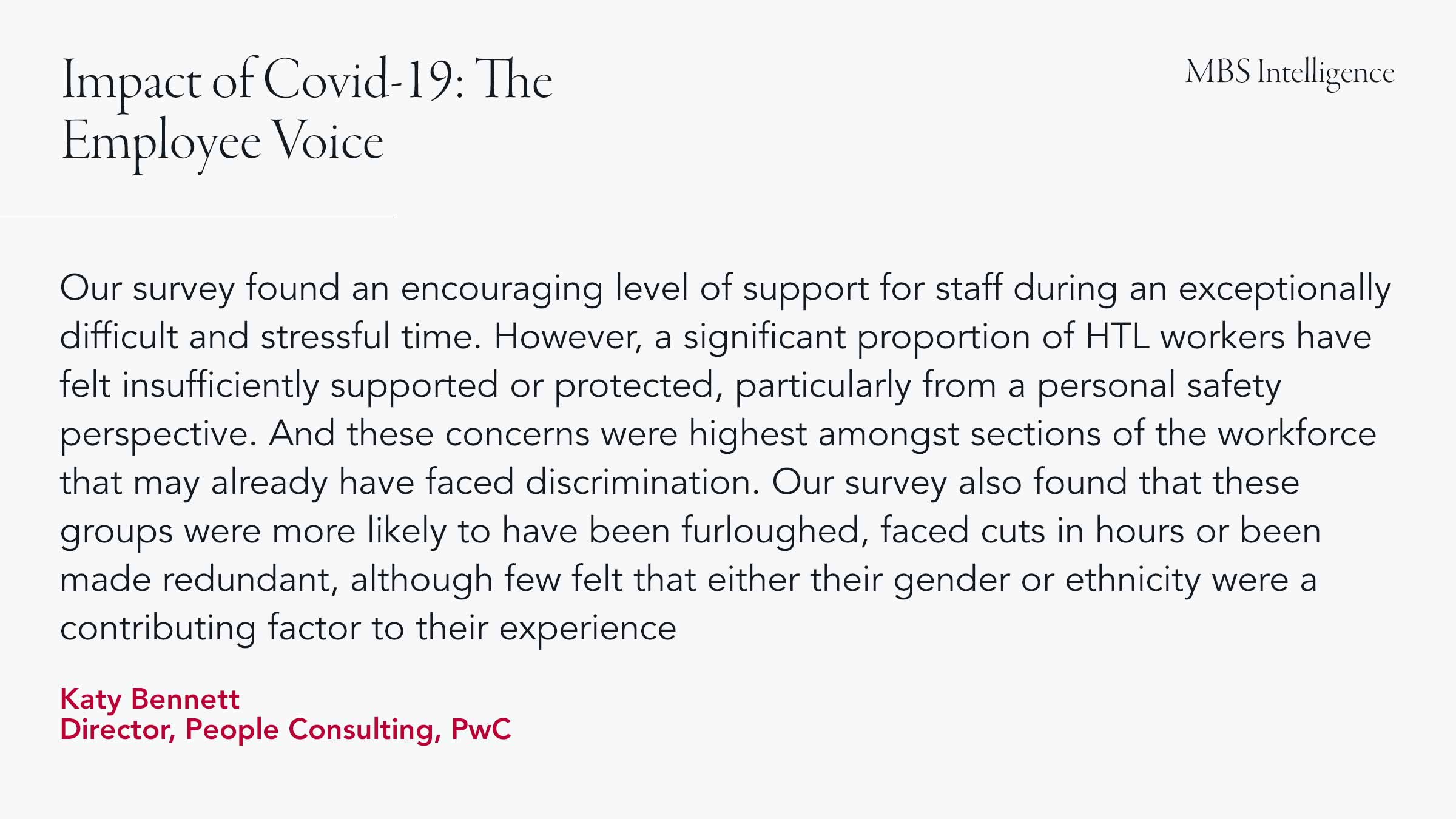Over the last few years, the travel, leisure and hospitality sector has been making some real strides on diversity and inclusion. By the end of 2019, there was hardly a business in the sector not taking D&I seriously – and investors, boards and executive teams were working together to drive meaningful change.
However, the disastrous impact of Covid-19 has already reversed much of this progress, and D&I has slipped right down the corporate list of priorities. In many ways, this is of course understandable. HTL businesses have been disproportionately affected by the pandemic: they have faced never-before-seen disruption, seen revenue streams reduced to zero , and in many cases, there is no clear pathway to resuming ‘business as usual’. Leaders have been forced to focus all their efforts on business survival and reimagining models of trading for our new normal.
Nevertheless, our view at The MBS Group remains clear: businesses that fail to prioritise D&I will suffer as they find themselves outrun by more forward-thinking competitors. Now more than ever, companies need creativity and varied insight as they rebuild their businesses and re-orientate themselves towards changing customer needs and behaviours. Diversity and plurality of thought will be critical in the weeks and months ahead.
With this in mind, The MBS Group, WiHTL and PwC set out to assess exactly how Covid-19 has impacted diversity in HTL. We are now proud to present this first-of-its-kind report, which measures the effect of Covid-19 response policies on women and those from ethnic minorities, and examines what impact the pandemic has had on D&I agendas. While this research focuses on hospitality, travel and leisure specifically, our conversations with Chairs, NEDs and senior executives from the consumer sector demonstrate that a similar story can be found across right across the consumer-facing space.
Starkly, our research shows that women and those from ethnic minority ethnic backgrounds are more likely to have been negatively impacted by Covid-19 than their male and/or white counterparts – and that immediate action must be taken to guard against further unintended negative consequences. The report finds that whilst many leaders in the sector have a good understanding of the risks to their D&I agenda, few have prioritised taking practical actions to mitigate the impact of the pandemic on women or ethnic minorities. As a result, there is now less female or minority ethnic representation in their Executive Committees or their Direct Reports, some visible role models have exited through redundancy programmes, and D&I budgets and diversity initiatives have been paused.
Of note, and as we have observed in previous reports on diversity, businesses have a lack of meaningful data on diversity. Across the sector, businesses have not measured – or do not have the data required to measure – the impact of their people policies, such as furloughing and redundancy programmes, on women and those from ethnic minorities. As a result, very few companies know the exact impact that Covid-19 has had on diversity in their business.
It is not our belief that HTL leaders are deliberately taking actions that impact negatively on gender and racial diversity. But without meaningful data it is impossible to know or, indeed, address. Looking ahead, the lack of accurate and timely data will act as a key blocker to long-term progress on diversity and inclusion in the HTL sector. As Katy Bennett, Director, People Consulting at PwC commented: “for many companies, collecting and considering diversity data as part of key decisions on pay and employment is a critical first step.”
Additionally, existing imbalances and discrepancies that exist in the HTL businesses have been exacerbated by Covid-19. For instance, with a few exceptions, roles traditionally dominated by men have been less likely to be furloughed or made redundant than those dominated by women. The finance function is a prime example of this – central to business survival and traditionally held by men. Similarly, more women have accepted voluntary redundancy packages than men due to caring responsibilities, or because they believe their roles (such as marketing, HR or legal) will be more easily transferrable to other sectors less impacted by Covid-19.
Our report indicates that Covid-19 will likely have a long-term impact on diversity in the sector. Firstly, restructures and voluntary redundancy schemes have decreased the number of visible female and ethnic minority role models in the sector, which have long been understood to play a key role in motivating diverse employees to progress and encouraging diverse candidates to enter the industry.
Secondly, cost-cutting measures have meant that many of the incredible initiatives designed to champion diversity and increase representation have been curtailed. D&I budgets in many businesses have been cut completely, and D&I professionals furloughed or made redundant. Additionally, at graduate/entry level, as the HTL sector has been one of the hardest hit by Covid-19, the most high-potential diverse talent may well choose to look to less high-risk sectors to start their career in the future.
This is not new a phenomenon. Following the 2008/9 financial crisis, female unemployment rates were higher than male, and ethnic minority groups also fared worse than the white majority, with higher unemployment, lower earnings, lower self-employment rates and higher housing costs.
Right now, the challenge facing busines leaders is to make an intentional effort to understand the impact of Covid-19 on their business from a diversity perspective. Once identified, strategies can be put in place to avoid or mitigate any negative effects of the pandemic, such as a decline in gender and ethnic minority representation or a sudden lack of role models.
The picture is not, however, all negative. Covid-19 has shown businesses that flexible and remote working policies can be highly effective – which possibly removes some of the traditional barriers to progression for women and those with caring responsibilities. Moreover, Covid-19’s disproportionate impact on those from minority ethnic communities – combined with the Black Lives Matter movement – has increased the awareness of issues such as systemic racism and ethnic minority representation. As put by Tea Colaianni, Founder and Chair of WiHTL: “this crisis might be the catalyst for more positive gendered and ethnic change if we are able to harness the benefits and mitigate the risks. This is the time to accelerate, propel and invest in diverse talent, creativity, innovation, create sustainable outputs and eliminate inequalities. It is not just a question of moral justice, it is a matter of competitive advantage in the face of huge adversity and uncertainty.”
Over the coming period, sectors such as hospitality, travel and leisure have many, many critical issues to address to ensure that they will survive, and then eventually emerge from this crisis stronger and forward-looking. D&I must be one of these issues. As Penny Hughes, Chair of The Gym Group commented when we presented our findings to the WiHTL advisory board: “Change is the moment when differences can be made.”
Elliott.goldstein@thembsgroup.co.uk | @TheMBSGroup
8th October: The impact of Covid-19 on people from ethnic minorities
Aimed at leaders from across the HTL sectors, this webinar will examine our research on how the crisis has impacted people from ethnic minorities, and provide detailed insight into how leaders can remain focused on D&I during these turbulent times. We would love you to join us – please click here to register.











